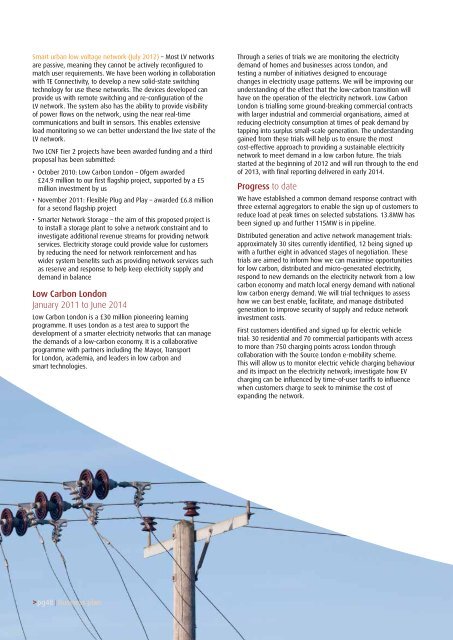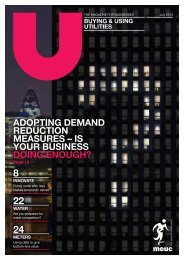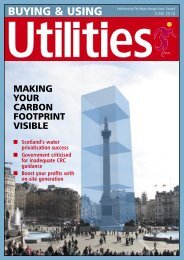Business plans - UK Power Networks
Business plans - UK Power Networks
Business plans - UK Power Networks
Create successful ePaper yourself
Turn your PDF publications into a flip-book with our unique Google optimized e-Paper software.
Smart urban low voltage network (July 2012) – Most LV networks<br />
are passive, meaning they cannot be actively reconfigured to<br />
match user requirements. We have been working in collaboration<br />
with TE Connectivity, to develop a new solid-state switching<br />
technology for use these networks. The devices developed can<br />
provide us with remote switching and re-configuration of the<br />
LV network. The system also has the ability to provide visibility<br />
of power flows on the network, using the near real-time<br />
communications and built in sensors. This enables extensive<br />
load monitoring so we can better understand the live state of the<br />
LV network.<br />
Two LCNF Tier 2 projects have been awarded funding and a third<br />
proposal has been submitted:<br />
• October 2010: Low Carbon London – Ofgem awarded<br />
£24.9 million to our first flagship project, supported by a £5<br />
million investment by us<br />
• November 2011: Flexible Plug and Play – awarded £6.8 million<br />
for a second flagship project<br />
• Smarter Network Storage – the aim of this proposed project is<br />
to install a storage plant to solve a network constraint and to<br />
investigate additional revenue streams for providing network<br />
services. Electricity storage could provide value for customers<br />
by reducing the need for network reinforcement and has<br />
wider system benefits such as providing network services such<br />
as reserve and response to help keep electricity supply and<br />
demand in balance<br />
Low Carbon London<br />
January 2011 to June 2014<br />
Low Carbon London is a £30 million pioneering learning<br />
programme. It uses London as a test area to support the<br />
development of a smarter electricity networks that can manage<br />
the demands of a low-carbon economy. It is a collaborative<br />
programme with partners including the Mayor, Transport<br />
for London, academia, and leaders in low carbon and<br />
smart technologies.<br />
Through a series of trials we are monitoring the electricity<br />
demand of homes and businesses across London, and<br />
testing a number of initiatives designed to encourage<br />
changes in electricity usage patterns. We will be improving our<br />
understanding of the effect that the low-carbon transition will<br />
have on the operation of the electricity network. Low Carbon<br />
London is trialling some ground-breaking commercial contracts<br />
with larger industrial and commercial organisations, aimed at<br />
reducing electricity consumption at times of peak demand by<br />
tapping into surplus small-scale generation. The understanding<br />
gained from these trials will help us to ensure the most<br />
cost-effective approach to providing a sustainable electricity<br />
network to meet demand in a low carbon future. The trials<br />
started at the beginning of 2012 and will run through to the end<br />
of 2013, with final reporting delivered in early 2014.<br />
Progress to date<br />
We have established a common demand response contract with<br />
three external aggregators to enable the sign up of customers to<br />
reduce load at peak times on selected substations. 13.8MW has<br />
been signed up and further 115MW is in pipeline.<br />
Distributed generation and active network management trials:<br />
approximately 30 sites currently identified, 12 being signed up<br />
with a further eight in advanced stages of negotiation. These<br />
trials are aimed to inform how we can maximise opportunities<br />
for low carbon, distributed and micro-generated electricity,<br />
respond to new demands on the electricity network from a low<br />
carbon economy and match local energy demand with national<br />
low carbon energy demand. We will trial techniques to assess<br />
how we can best enable, facilitate, and manage distributed<br />
generation to improve security of supply and reduce network<br />
investment costs.<br />
First customers identified and signed up for electric vehicle<br />
trial: 30 residential and 70 commercial participants with access<br />
to more than 750 charging points across London through<br />
collaboration with the Source London e-mobility scheme.<br />
This will allow us to monitor electric vehicle charging behaviour<br />
and its impact on the electricity network; investigate how EV<br />
charging can be influenced by time-of-user tariffs to influence<br />
when customers charge to seek to minimise the cost of<br />
expanding the network.<br />
>pg48 | <strong>Business</strong> plan







